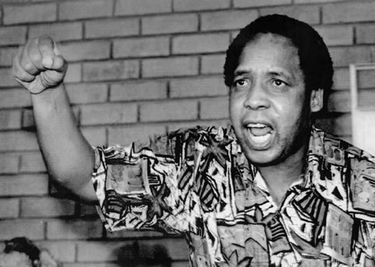“Comrades against Apartheid” is a 1992 work by Stephen
Ellis, a British scholar specializing in African affairs. He is described as a
journalist at several points in the book. His co-writer is a mysterious member
of the ANC and the South African Communist Party (SACP) who wishes to remain
pseudonymous. This creates a certain tension, since the text of the book
sometimes descends into Marxist phraseology, while at other times sounding more
“objective”. Sechaba is presumably a dissident member of the SACP who still
holds fast to a certain kind of Marxist analysis.
I don't know how people reacted to this book back in 1992, but I can well imagine. Internationally, and certainly in Sweden, the ANC was portrayed as a broad, democratic and multi-racial movement, a kind of South African Social Democrats. Its alliance with the SACP was no secret, but it was portrayed as an alliance of two distinct organizations, with ANC somehow being the more legitimate party. The armed struggle of the Umkhonto we Sizwe (Spear of the Nation or MK, described as ANC's armed wing) was played down. The ANC and its leaders had an almost saintly halo. To some extent, this was understandable, even inevitable, since the Congress was fighting “a system rare in its despicability”, to quote Swedish Prime Minister Olof Palme's description of apartheid. 1992 probably wasn't the right time for a reassessment, since the National Party was still in power and the fate of South Africa still hung in the balance. Today, “Comrades against Apartheid” might fill a niche, however. Ellis has also written a more recent book on the ANC, “External Mission”, but I haven't read it yet – ironically, it was unavailable from the Swedish vendor I sometimes use for procuring books of this kind, while the older work was readily available.
The picture of the ANC emerging from Ellis' book is strikingly different from the official one. The secretive Communist Party more or less completely dominated the ANC, in effect using the ANC as a front group. Most members of the ANC's National Executive Committee (NEC) were also party members. Many important leaders on lower levels were also SACP cadres. Several of the organizations which signed the Freedom Charter were Communist fronts. Umkontho we Sizwe was the joint ANC-SACP armed wing, and it too was really controlled by Communists (most notably Joe Slovo and Chris Hani). Ironically, the SACP was the most multi-racial component of the Congress Alliance. ANC originally banned non-Blacks from positions on the NEC, a position reversed only in 1985 at the behest of the Communist Party. The SACP was a staunchly pro-Soviet loyalist party. While its 1989 congress was held in Cuba (due to Soviet leader Gorbachev's thaw with the West), several earlier congresses were held in Moscow. Many ANC-SACP cadres were trained in the Soviet Union, Bulgaria or East Germany. However, Ellis also reveals that the most heterodox ANC-SACP leader, Thabo Mbeki, was close to Swedish Social Democracy, which made him suspect in the eyes of the more doctrinaire party stalwarts! Mbeki subsequently became president of post-apartheid South Africa.
“Comrades against Apartheid” also details the mutinies in the ANC camps in Angola and elsewhere, and how the mutineers were suppressed by an increasingly paranoid ANC security apparatus. It should be pointed out that Ellis also documents the brutal counter-insurgency of the apartheid regime, which included targeted assassinations, wholesale destabilization of South Africa's Black neighbors (the Frontline states) and the use of Black double agents and collaborators to infiltrate and attack the ANC and other anti-apartheid movements.
On one point, I think Ellis is surely wrong. He plays down the political importance of the domestic resistance to the apartheid regime, and also claims that the ANC-SACP didn't really control it. F W De Klerk's change of strategy, in Ellis' opinion, was due to international factors outside the anti-apartheid movements' control, most notably the thaw between Gorbachev and the United States. In reality, the ANC was surely the center point of a complex web of both domestic and international events. The apartheid system was clearly unsustainable, and one of the “foreign” events that forced a retreat was the defeat of the South African Defence Force (SADF) at the hands of Cuban troops at Cuito Cuanavale in Angola, an event extensively mentioned by Ellis himself. Apartheid would have fallen sooner or later, but without the temporary stalemate between the contenders and the changing international situation, its termination would have been more brutal and chaotic (or more “revolutionary”, if you like that better).
While “Comrades against Apartheid” of course doesn't de-legitimize the ANC's struggle against the despicable racist system of old South Africa, it at least gives the reader the truth, warts and all, about the Congress Alliance and the possibility of giving informed consent, at least in hindsight.

No comments:
Post a Comment